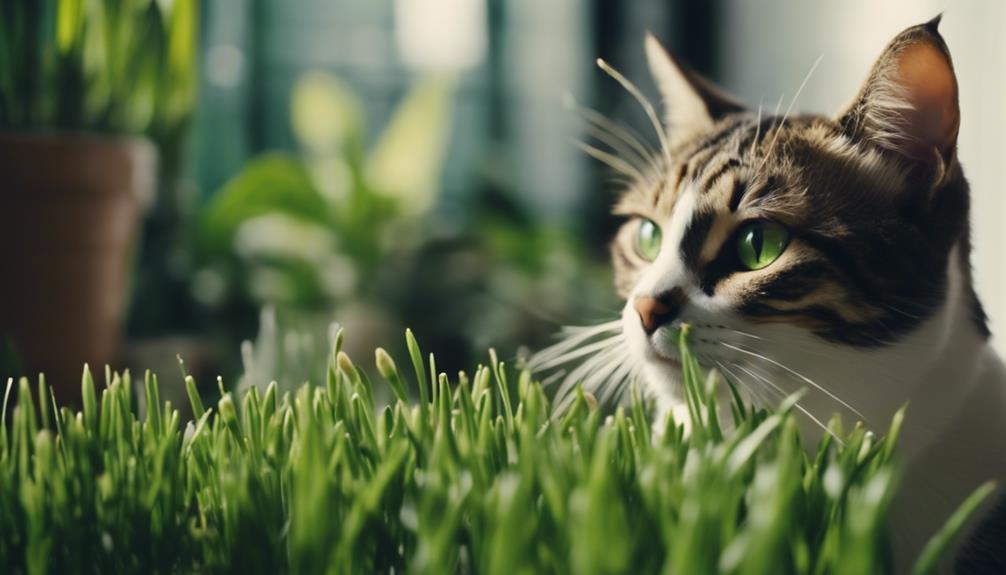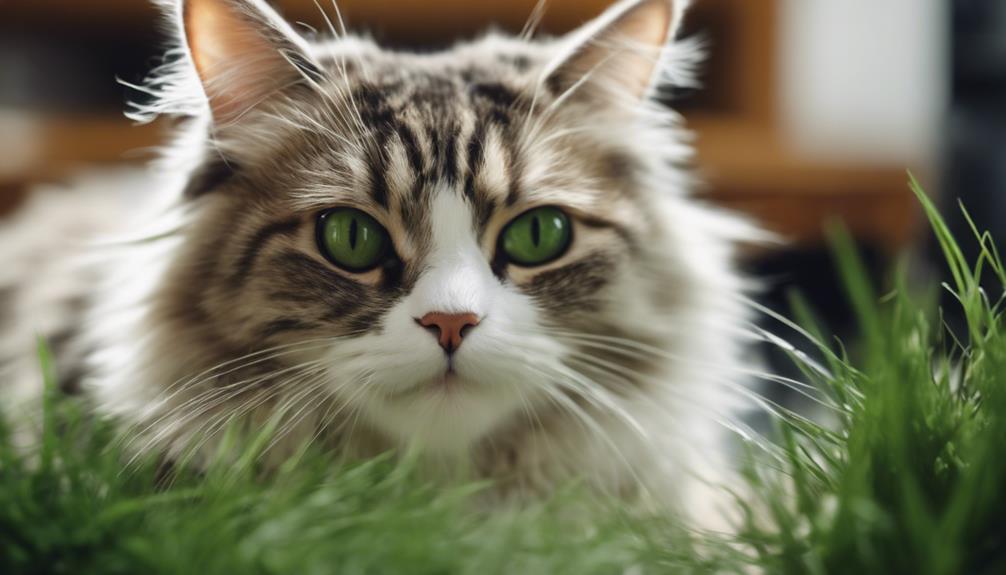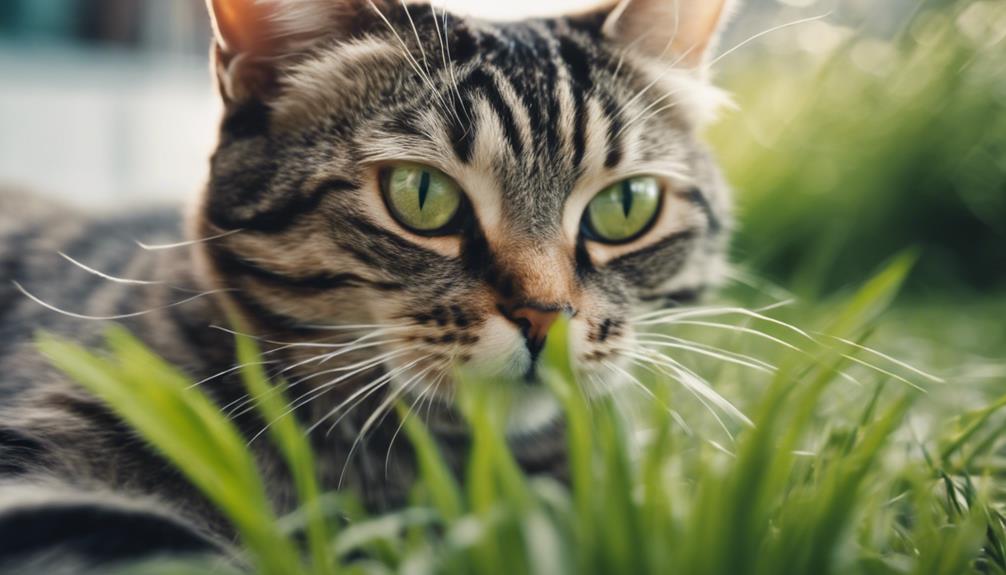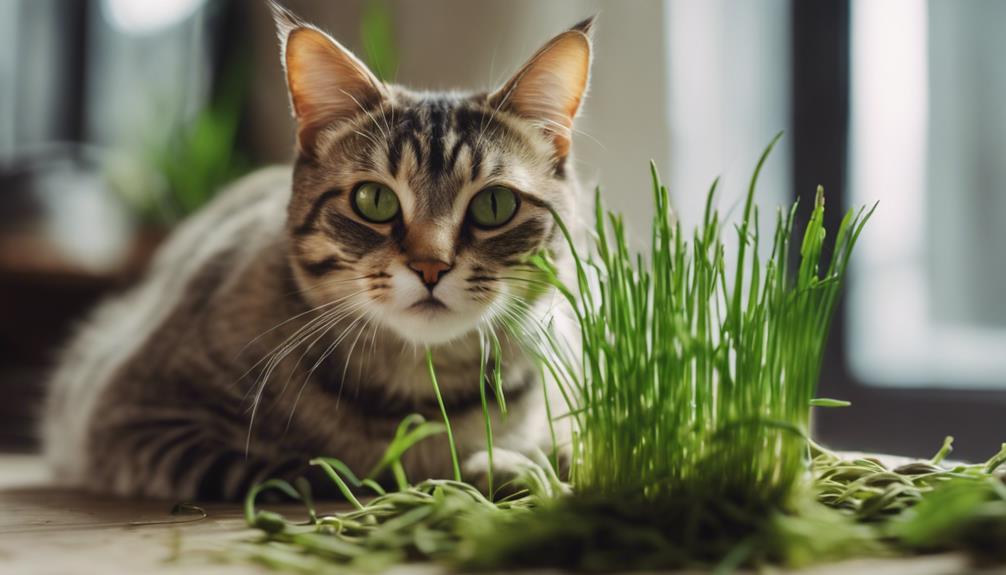Exploring the enigmatic behavior of cats consuming grass unveils a world of intriguing feline instincts. The quest to decipher why these mysterious creatures engage in such a seemingly peculiar act leads to a deeper understanding of their dietary requirements and innate instincts.
Unraveling the secrets behind their grass-eating habits sheds light on a crucial aspect of their well-being, offering a glimpse into the intricate world of feline nutrition. Stay tuned to uncover the underlying motivations driving this behavior and discover how you can satisfy your cat's grassy cravings indoors in a safe and fulfilling manner.
Key Takeaways
- Cat grass aids in digestion and helps cats eliminate indigestible matter.
- Indoor cats benefit from having access to edible grass for health.
- Limiting grass intake prevents digestive issues in cats.
- Creating an indoor kitty garden provides a safe way for cats to satisfy their grass-eating instincts.
Reasons Cats Eat Grass
Cats instinctively consume grass for various reasons, including aiding digestion and potentially expelling indigestible material. This behavior is believed to help cats with their digestive system by adding fiber to their diet and assisting in the passage of hairballs or other indigestible items.
Grass consumption can stimulate regurgitation, allowing cats to rid themselves of unwanted substances that may be causing gastrointestinal discomfort. While cats are obligate carnivores, meaning they require meat in their diet, grass can act as a natural laxative, helping to move food through their system.
Nutritional Benefits of Cat Grass
After understanding the reasons behind cats' instinct to consume grass, it becomes evident that exploring the nutritional benefits of cat grass is crucial in comprehending its role in feline health.
Cat grass provides essential fiber that aids in digestion, helping to prevent hairballs and promote gastrointestinal health. Additionally, cat grass contains essential nutrients like folic acid, which can contribute to a well-rounded diet for cats. By offering cat grass as a dietary supplement, indoor cats can enjoy the benefits of outdoor grazing while safely indoors.
However, it is important to monitor your cat's consumption of grass to prevent overindulgence, which can lead to digestive issues. Overall, incorporating cat grass into your cat's diet can enhance their overall well-being and provide a natural source of nutrition.
Cat Grass for Indoor Cats

In providing a safe and beneficial alternative for indoor cats to satisfy their natural urge to consume grass, cat grass serves as an excellent solution. Cat grass offers numerous advantages for indoor felines, such as providing a source of entertainment, aiding in digestion, and promoting overall well-being.
Here are three key points to consider when introducing cat grass to your indoor cat's environment:
- Entertainment: Cat grass provides a stimulating and interactive element for indoor cats, keeping them engaged and mentally stimulated.
- Digestive Health: Consuming cat grass can help indoor cats with digestion by aiding in the elimination of hairballs and indigestible matter.
- Wellness Benefits: Cat grass offers various nutrients and vitamins that can contribute to the overall health and vitality of indoor cats.
Cat Grass for Digestive Health
Utilizing cat grass as a natural aid in promoting digestive health for indoor felines is a prudent strategy for pet owners seeking to enhance their cats' overall well-being. Cat grass provides essential fiber that aids in digestion and helps cats expel indigestible matter through vomiting. While indoor cats may not have access to outdoor grass, growing cat grass indoors can offer them a safe and beneficial alternative. However, it is important to monitor your cat's consumption to prevent overindulgence and potential digestive issues.
| Benefits of Cat Grass for Digestive Health | Description |
|---|---|
| Aids Digestion | Provides essential fiber |
| Helps with Hairballs | Assists in expelling indigestible matter |
| Prevents Constipation | Promotes healthy digestion |
| Encourages Hydration | Adds moisture to the diet |
Feeding Habits of Cats

Feeding patterns play a crucial role in maintaining the health and well-being of cats.
Key Points:
- Cats need a diet rich in meat for survival.
- Grass aids in digestion by helping food move through their system.
- Vomiting after consuming grass can be a natural and healthy behavior.
Cats are obligate carnivores, meaning their diet must include meat to meet their nutritional requirements. However, many cats also enjoy consuming grass, which can provide additional fiber and help with digestion. The act of vomiting after eating grass is a normal way for cats to rid themselves of indigestible material and can contribute to their overall well-being.
Grass as a Dietary Supplement
When considering feline nutrition enhancement, incorporating grass as a dietary supplement can provide valuable benefits. Cat grass is rich in fiber, aiding digestion, and helping cats expel indigestible material through vomiting. However, it's essential to monitor your cat's grass consumption to prevent potential digestive issues. Here is a breakdown of the benefits of grass as a dietary supplement in a table format:
| Benefits of Grass | Description | Effect |
|---|---|---|
| Rich in Fiber | Aids digestion by promoting the movement of food | Helps prevent constipation |
| Natural Hairball Remedy | Assists in dislodging hairballs from the digestive tract | Reduces hairball-related issues |
| Source of Vitamins | Contains essential vitamins and nutrients | Supports overall health |
Preventing Digestive Upset in Cats

Incorporating appropriate dietary supplements, such as grass, can play a crucial role in maintaining digestive health and preventing upset in cats.
To prevent digestive upset in cats, consider the following:
- Monitor Grass Intake: Keep track of how much grass your cat consumes to prevent overindulgence, which can lead to digestive issues.
- Provide Digestive Aids: Offer cat-friendly digestive aids like probiotics or digestive enzymes to support your cat's digestive system.
- Regular Veterinary Check-ups: Schedule routine check-ups with your veterinarian to ensure your cat's digestive health is in optimal condition and address any concerns promptly.
Indoor Cat Grass Growing Tips
To cultivate thriving indoor cat grass, consider implementing these essential growing techniques.
Choose a shallow container and fill it with potting soil, then sow cat grass seeds evenly across the surface. Press the seeds lightly into the soil and mist with water.
Place a small bowl in the container and keep the soil consistently moist and warm. Position the container in a sunny area, ensuring it's out of reach of other pets.
Within 10-14 days, the grass should be ready for your cat to enjoy. Remember to clean and refill the water dish frequently to entice your cat to munch on the grass.
Understanding Cat Grass Consumption

Understanding the reasons behind cats' consumption of grass is essential for pet owners seeking to provide optimal care for their feline companions. Here are three key points to consider:
- Natural Instinct: Cats are obligate carnivores, meaning they must eat meat to survive. However, they may instinctively consume grass to aid in digestion and to help eliminate fur balls from their stomachs.
- Nutritional Benefits: Grass contains essential nutrients and fiber that can benefit a cat's digestive system. Consuming grass may also help cats regurgitate indigestible matter, promoting overall gut health.
- Behavioral Enrichment: For indoor cats, having access to cat grass can mimic the outdoor experience, providing mental stimulation and fulfilling their natural inclination to graze.
Satisfying Cat's Grass Appetite
Catering to a cat's natural craving for grass can be achieved through strategic indoor gardening solutions. By creating an indoor kitty garden, you can provide your feline friend with a safe and accessible source of grass. Here is a simple guide to help you satisfy your cat's grass appetite indoors:
| Steps to Create an Indoor Kitty Garden | Benefits of Cat Grass | Feeding Frequency |
|---|---|---|
| Fill a container with potting soil and sow cat grass seed. | Adds fiber to a cat's diet, aiding digestion. | Cats need meat to survive but enjoy the texture and flavor of grass. |
| Sink a small bowl into the soil and keep it moist and warm. | Cats may eat grass to vomit indigestible contents. | Grass helps cats work food through their system. |
| Place the container in a sunny spot and out of reach of pets. | Indoor cats benefit from having access to edible grass. | Vomiting after eating grass is healthy for cats. |
Conclusion
In conclusion, cats eat grass for digestive health benefits, and providing cat grass indoors can help satisfy their natural cravings.
For example, a study conducted by veterinary researchers found that indoor cats who had access to cat grass exhibited fewer signs of digestive upset compared to those without.
By incorporating cat grass into their environment, pet owners can support their feline companions' well-being and promote a healthier lifestyle.




